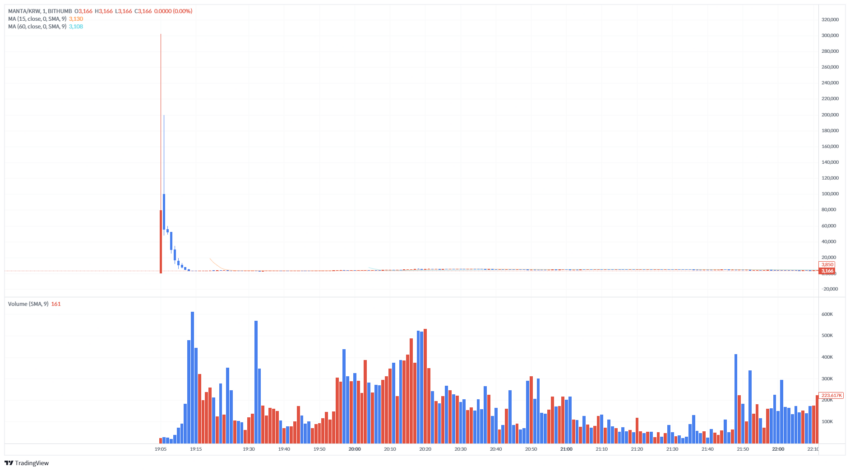Binance Launchpool’s Manta Network is facing serious allegations of money laundering following its debut on the Bithumb exchange platform.
The accusations, primarily sourced from a Twitter user, point towards suspicious activities involving the transfer and sale of Manta tokens (MANTA) on the day of its listing.
Manta Network Off to a Rocky Start
The controversy centers on a transaction reportedly transferring 2 million MANTA tokens to the personal wallet of Manta Network’s Korean Business Development. Currently, BeInCrypto cannot verify that this wallet belongs to the person in question, and these claims are only speculation.
These tokens were then allegedly deposited into a Bithumb deposit wallet, accounting for over 75% of Bithumb’s total circulation volume for the token.
Within just 5 minutes of its listing, the price of MANTA on Bithumb skyrocketed to an astonishing 300,000 KRW ($230). Within minutes, token prices plummeted back to the 3,000 KRW level where they are currently trading.

Further adding to the suspicion, the accuser claims that this person then sold all 2 million MANTA tokens at the top. Reportedly, they transferred the proceeds, about 2,094.7 ETH (worth around $5,162,112), to their personal wallet.
Read more: Top 20 Crypto Launchpads To Jump On in January 2024
Bad Actors Target Binance Launchpool Projects
Amid these allegations, Manta Network also grappled with a severe Distributed Denial-of-Service (DDoS) attack. Kenny Li, co-founder of P0xeidon Labs, reported over 135 million RPC requests bombarding the blockchain’s nodes on January 18.
18 hours post-warning, Li tweeted about the blockchain’s normal operation and fund safety. He added:
“We know that today was supposed to be a very exciting day for everyone, and we are disappointed that this was impacted by malicious actors attempting to cause harm not just to Manta, but to all of its users and projects. But we remain resilient and continue to fight and build just as we have been doing for the past three years, and just as we will continue to do in the future.”
These incidents are not isolated. Binance Launchpool has faced similar controversies in the past. PeckShield, a blockchain security firm, reported instances where scammers launched fake tokens, such as Sleepless AI and FomoFi, ahead of their official Launchpool debuts.
These fraudulent activities led to significant financial losses for investors, with prices of these fake tokens plummeting drastically post-scam.
In adherence to the Trust Project guidelines, BeInCrypto is committed to unbiased, transparent reporting. This news article aims to provide accurate, timely information. However, readers are advised to verify facts independently and consult with a professional before making any decisions based on this content.
This article was initially compiled by an advanced AI, engineered to extract, analyze, and organize information from a broad array of sources. It operates devoid of personal beliefs, emotions, or biases, providing data-centric content. To ensure its relevance, accuracy, and adherence to BeInCrypto’s editorial standards, a human editor meticulously reviewed, edited, and approved the article for publication.

